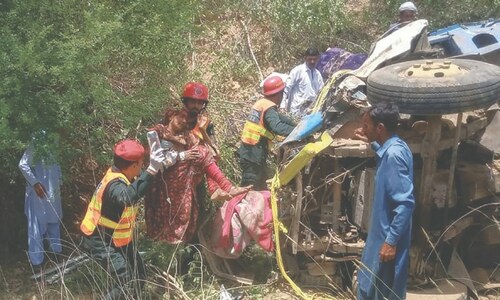ISLAMABAD, Nov 5: The World Islamic Economic Forum (WIEF) began here on Sunday with the resolve to restore the image of Islam and Muslims in the globalised world and integrate their synergies for economic renaissance to have a respectable say in international politics.
The theme of inaugural speeches of Prime Minister Shaukat Aziz and his Malaysian counterpart Abdullah Ahmed Badawi at WIEF’s second session was almost the same. It revolved around the need for Muslim renaissance and unity and called for joint efforts to remove misperceptions in the West about Islam and its followers.
The two leaders asked the international community to address the root cause of terrorism to make the world a better place to live. They shared views for revitalisation of the Organisation of Islamic Conference (OIC).
Islamic Development Bank president Dr Ahmed Mohammad Ali emphasised the need for joint efforts for reducing poverty, improving the conditions of people and bringing women into the mainstream society.
Mr Badawi said the challenge before the Muslim world is to confront the “ugly realities” of the present situation and it must restore the image of Islam and Muslims.
“We must strive for a renaissance of the Islamic civilisation. We must recover the hallmarks of that civilisation which is peace, prosperity and dignity and this quest for international respect and dignity must begin at home.”
He said that Muslims’ battle fronts were not only economic and political but it was also a crucial struggle to transform the mindsets to instil in people the correct understanding of Islam.
“We must make our people realise that because of our lack of capacity, compounded by our lack of unity, Muslim nations are often left on the periphery of the global order. Although we are big in numbers, we have little influence in world affairs and (are) accorded little respect in the international community of nations.”
The Malaysian prime minister said that Islami countries should cooperate with each other on international economic issues, enhance unity in political matters and must be competitive and efficient producers of goods and services.
He said the OIC’s 57 members had less than 5 per cent of the total GDP and 31 of them were classified as least developed, low-income countries while their internal trade represented only 6-7 per cent of total global trade.
He urged the Muslim countries to reduce poverty and help other Islamic nations to come out of poverty by removing weaknesses and vulnerabilities. Secondly, they should forge greater unity among themselves. Thirdly, they should work for removal of antagonism existing between the West and the Muslim world.
This, he stressed, was not only the biggest challenge in the world but the biggest crisis facing the Muslim nations. Muslim nations have been humiliated by the hegemonic tendencies of global powers as exemplified by the subjugation of Palestine, Afghanistan, Iraq and Lebanon and Muslims should remove the equation of Islam with terrorism.
He said that the Muslims must secure the economic clout to be able to wield political influence, for which Islamic countries possessed necessary potential in the form of 1.25 billion population and about 70 per cent of global energy.
Prime Minister Aziz said that public opinion in the western world was gripped by misperceptions about Islam while “Muslims in Iraq, Afghanistan, Palestine, Lebanon and Kashmir continue to face insecurity, death and destruction.” He said the world community had a responsibility to remove the causes of injustices and frustration so that a lasting solution to extremism and terrorism could be found.
He presented a seven-point agenda, including a proposal for the creation of an Islamic Economic Union, as a first step towards integrated and calibrated efforts for Muslim economic renaissance and entering into multilateral free trade arrangements.
Mr Aziz said that vast majority of Muslims lived in poverty and backwardness. Nearly 39 per cent of the world’s Muslim population lived below the poverty line and although it made up 19 per cent of the world’s population, it made up only 6 per cent of its income.
He said that Muslims’ share in global trade was barely 7-8 per cent, while there was only 13 per cent of total trade among the Muslim nations. No Muslim nation is among the group of developed industrialised countries, he pointed out.
He said that Muslims should evolve an effective mechanism to resolve issues, put in place a framework for mutual cooperation to promote unity within the Islamic countries and broaden economic relations.
The Islamic countries, he said, must undertake political, economic and social reforms to create an enabling environment for harnessing individual and collective potential. They must ensure political stability and continuity, good governance, transparency and accountability as well as consistent economic policies and improved delivery of social services, especially in health and education.
He asked Islamic nations to catch up with the West in the field of science and technology. Skill development through vocational training should receive priority to equip workforce with capabilities which are in demand in national and international markets.
Mr Aziz also called for evolving a comprehensive growth model to provide a strategy for balanced development and for sharing of financial and commodity surpluses through institutional mechanisms driven by public-private partnerships.















































Dear visitor, the comments section is undergoing an overhaul and will return soon.